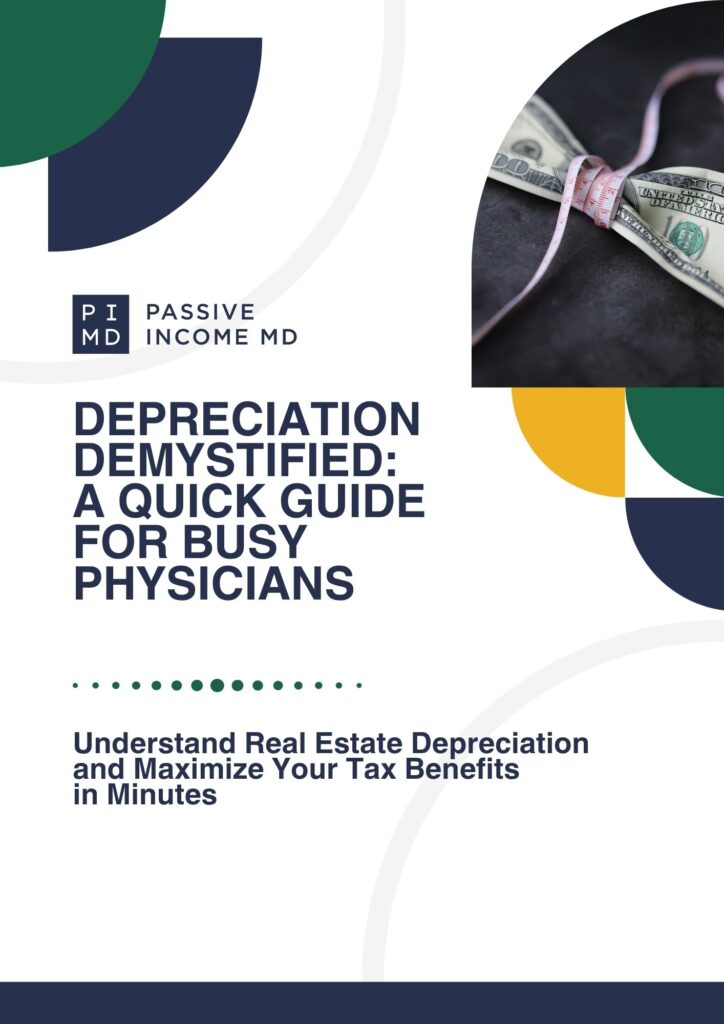What if there was a way to own real estate, collect steady cash flow, and still show a loss on your taxes?
For many investors, especially physicians with high incomes, that is not only possible, but it is one of the biggest advantages of owning real estate. The secret lies in a tax concept called depreciation. While it is often misunderstood or overlooked, depreciation can be a powerful tool to reduce your taxable income, grow your wealth faster, and keep more of what you earn.
If you are a physician investing in real estate or considering it, understanding how depreciation works is essential. In this post, we will break down the basics of what depreciation is, how it reduces your taxes, what happens when you sell, and how to use it strategically.
You will also see real-world examples along the way, so you can apply it directly to your own situation.
Disclaimer: This article is for informational and educational purposes only and does not constitute financial, legal, or investment advice. Any investment involves risk, and you should consult your financial advisor, attorney, or CPA before making any investment decisions. Past performance is not indicative of future results. The author and associated entities disclaim any liability for loss incurred as a result of the use of this material or its content.
What Is Real Estate Depreciation?
Depreciation is a tax deduction that allows you to recover the cost of your rental property over time. The IRS assumes that the building portion of your investment loses value each year due to wear and tear. Even if your property is actually appreciating in the real world, you can still claim this paper loss for tax purposes.
For residential rental properties, the IRS allows you to depreciate the value of the building over 27.5 years. For commercial properties, it is 39 years. You cannot depreciate the land, only the structure.
For example, let’s say you buy a rental property for $500,000. After a cost allocation, you determine that $400,000 of that purchase price applies to the building and $100,000 to the land. You can depreciate the $400,000 over 27.5 years, which gives you an annual deduction of around $14,545. That is money you get to deduct from your rental income each year without actually spending anything.
Why Depreciation Is So Powerful for Physicians
Depreciation directly reduces the taxable income you report from your rental property or other passive income from real estate… investments like syndications and funds. That means if your rental generates cash flow or you get distributions from your syndications, you may still show a loss on paper.
Let’s say you earn $10,000 in rental income from your property, but you claim $13,000 in depreciation and other expenses. On paper, your property shows a $3,000 loss. That loss can be used to offset other passive income.
Now if you qualify as a real estate professional (REPS) or materially participate in short-term rentals, that loss could even offset your W-2 or 1099 clinical income.
This is a huge benefit for physicians who are in higher tax brackets. Depreciation allows you to lower your overall tax liability while your property still puts cash in your pocket.
Accelerated Depreciation and Cost Segregation
Cost segregation is a more advanced strategy that allows you to take larger depreciation deductions earlier in your ownership period. Instead of depreciating everything evenly over 27.5 years, a cost segregation study separates the property into components like flooring, lighting, appliances, and landscaping. These shorter-life assets can be depreciated over five, seven, or fifteen years.
On top of that, bonus depreciation lets you deduct a large portion of those short-life assets in year one. As of now in 2025, bonus depreciation is being phased down from its peak of 100 percent, but there is current legislation being considered to restore it back to 100% this year. Even at reduced levels, it still provides significant upfront deductions.
For example, by using cost segregation, you might be able to deduct $100,000 in the first year alone, instead of spreading it out gradually over 27.5 years. This is especially helpful in syndications or multifamily investments where large upfront deductions can shelter cash flow or offset other passive gains.
What Happens When You Sell: Depreciation Recapture
Depreciation is a powerful benefit, but it is not a permanent tax shield. When you sell the property, the IRS wants to “recapture” the depreciation you claimed.
This means that the amount you deducted over the years is taxed upon sale, typically at a rate of up to 25 percent. It is called depreciation recapture, and it applies even if you never actually benefited from the deductions because of other losses.
For example, if you claimed $100,000 in depreciation over several years, when you sell, you may owe up to $25,000 in taxes just from recapture. This is separate from capital gains tax and often catches investors off guard.
![[PIMD] Depreciation Demystified A Quick Guide for Busy Physicians](https://passiveincomemd.com/wp-content/uploads/2025/07/PIMD-Depreciation-Demystified-A-Quick-Guide-for-Busy-Physicians-724x1024.jpg)
Strategies to Reduce or Defer Depreciation Recapture
The good news is there are ways to reduce or even defer recapture taxes.
One option is a 1031 exchange. This allows you to sell one property and reinvest the proceeds into a like-kind property, deferring both capital gains and depreciation recapture taxes. It is a common move for experienced real estate investors looking to scale their portfolios.
Another option is investing in Opportunity Zones. These allow you to defer gains and, depending on the investment timeline, potentially reduce or eliminate some taxes altogether.
A step-up in basis at death can also eliminate recapture. When property is inherited, the cost basis resets to the current market value, which can wipe out all prior depreciation. This makes real estate a powerful legacy-building tool.
You can also combine depreciation strategies with capital gains planning, such as tax-loss harvesting or charitable giving, to offset the tax impact.
For example, a physician sells a rental property and uses a 1031 exchange to purchase a larger multifamily building. The $60,000 she would have owed in taxes is deferred, and her new property starts a fresh depreciation schedule.
Physician Case Study
Let’s look at Dr. Smith, an anesthesiologist with 1099 income. She buys a short-term rental for $750,000 and hires a cost segregation firm. In year one, she claims $200,000 in bonus depreciation. Because she actively manages the property and qualifies for material participation, she uses that $200,000 to offset a large portion of her clinical income.
Three years later, she sells the property for $900,000. Without planning, she would owe recapture and capital gains taxes. Instead, she executes a 1031 exchange into a new property in a different market, deferring the entire tax liability and restarting the depreciation cycle.
Common Mistakes to Avoid
Depreciation is powerful, but it can backfire if you do not plan for it. Here are a few common mistakes physicians make:
- Not accounting for depreciation recapture when analyzing a deal
- Forgetting to depreciate a property (yes, some accountants miss it)
- Overestimating how depreciation offsets income without qualifying for real estate professional status
- Assuming rental losses can always be deducted against W-2 income
Always work with a CPA who understands real estate investing to make sure your strategy is optimized.

Subscribe to receive the 7 Steps you can follow to achieve Financial Freedom
If financial freedom is your goal, there’s no better time to get started than right now.
Unlock actionable steps that you can take every day to fine-tune your goals, discover your interests, and avoid costly mistakes on your financial freedom journey.
Final Thoughts: Use It Strategically
Depreciation is not a loophole. It is a built-in feature of the tax code designed to encourage investment in housing and infrastructure. When used strategically, it can reduce your tax burden, boost your returns, and accelerate your path to financial freedom.
As a physician, you already work incredibly hard. Your investments should work just as smart. Learning how depreciation works (and how to use it) is one of the most important steps in growing your wealth through real estate.
If you want to better understand depreciation and other real estate strategies that can impact your income and tax situation as a physician, consider joining Passive Real Estate Academy. In just a few months, you can go from feeling uncertain to investing with clarity and confidence.
Were these helpful in any way? Make sure to sign up for the newsletter and join the Passive Income Docs Facebook Group for more physician-tailored content.
Peter Kim, MD is the founder of Passive Income MD, the creator of Passive Real Estate Academy, and offers weekly education through his Monday podcast, the Passive Income MD Podcast. Join our community at the Passive Income Doc Facebook Group.

![Profiting from the UK stock market liquidation [Members] Profiting from the UK stock market liquidation [Members]](https://vdrfinance.one/wp-content/uploads/2025/07/Moguls-Main.jpg)







